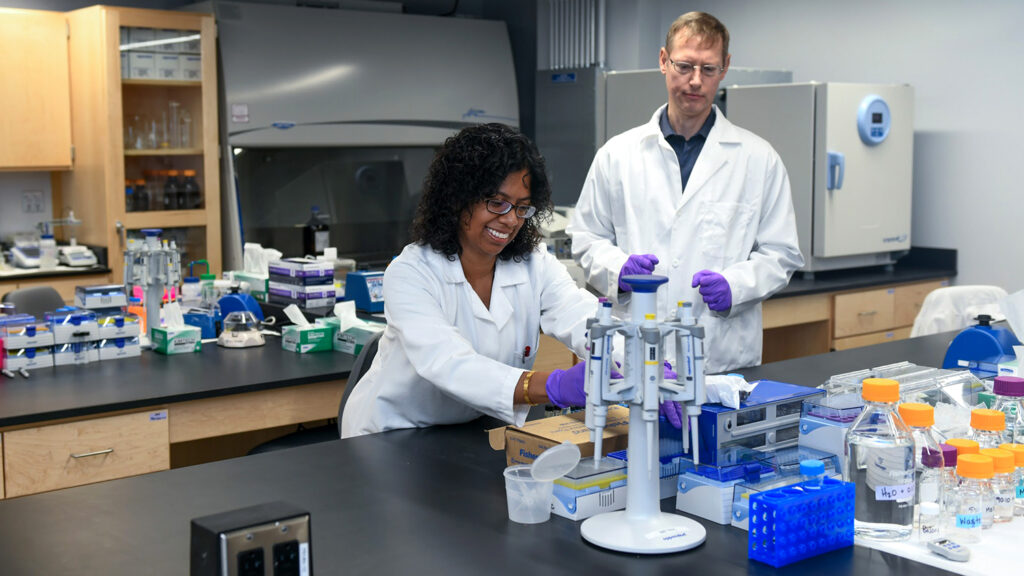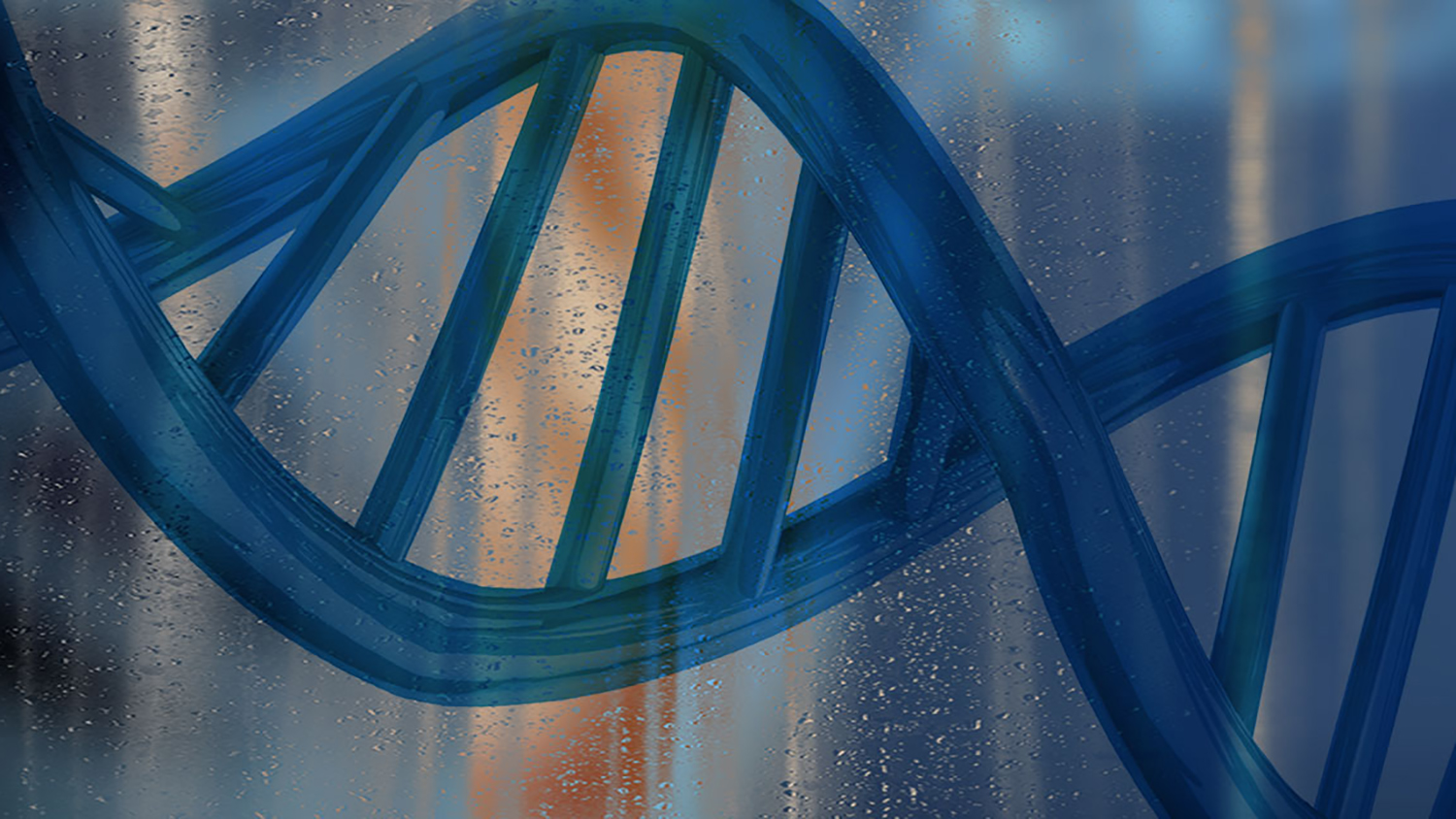
Shared Core Research Facilities
NC State’s Office of Research and Innovation oversees six university Shared Core Research Facilities that house a variety of state-of-the-art instruments. Each of these facilities is staffed by scientists who offer hands-on training, specialized research services and project consultation.
Analytical Instrumentation Facility (AIF)
The Analytical Instrumentation Facility (AIF) is NC State’s primary shared facility for materials characterization — with a mission to enable and lead state-of-the-art research through acquisition, development, maintenance, training, and access to major analytical and materials characterization instrumentation. Through the support of engaged faculty and experienced staff, the AIF supports state-of-the-art scanning and transmission electron microscopes, X-ray scattering and spectroscopy instruments, mass spectrometry, scanning probe and Raman microscopy, nanoindentation, and extensive sample-preparation facilities. Some of the extraordinary capabilities of these instruments include chemically sensitive atomic-scale imaging, extreme-resolution SEM of insulating and soft materials, in situ high-temperature and electric-field-dependent X-ray diffraction, cryogenic SEM of biological and soft materials, and in situ microscopy during heating, electrical current, immersion in fluids, and in flowing gases — to name a few. The AIF is positioned within the College of Engineering.
Cellular and Molecular Imaging Facility (CMIF)
The Cellular and Molecular Imaging Facility (CMIF) is NC State’s primary shared research and teaching resource for advanced light microscopy and supports a growing number of NC State faculty research programs spanning six colleges. Its experienced staff provides expert training and support for all instrumentation and software available in the facility. In addition to transmitted-light and widefield fluorescence microscopes, CMIF currently houses several laser-scanning confocal microscopes —Zeiss LSM 710, Zeiss LSM 880 with Airyscan, Zeiss Lightsheet Z.1 — and is in the process of setting up two spinning-disk confocal microscopes with laser-ablation capabilities. These state-of-the-art imaging tools incorporate the latest technological advances and can be used to visualize and analyze biological samples and soft materials. Applications include advanced fluorescence techniques such as quantitative 3-D and 4-D live-cell image imaging, 3-D Raster Image Correlation Spectroscopy (RICS), and super-resolution. To update and strategically expand capabilities that enhance NC State’s research environment, CMIF works with engaged faculty on instrumentation grants and maintains a prioritized wishlist.
Genomic Sciences Laboratory (GSL)
The Genomic Sciences Laboratory (GSL) was established to provide NC State faculty, their collaborators and the broader scientific community with the tools and infrastructure necessary to conduct advanced genomics research. The GSL offers traditional Sanger sequencing and Genotyping, as well as Next-Generation Sequencing (NGS) — including Illumina MiSeq, NextSeq, and HiSeq 2500 platforms, plus a new, state-of-the-art PacBio Sequel for long-read de novo genome sequencing. The GSL also provides shared equipment resources for faculty and students, including a BioRAD CFX384 qPCR, BioRAD QX200 digital droplet PCR, Covaris S220 Ultrasonicator, Synergy H1 Hybrid Plate reader and Qiagen tissue-lyzer instruments. Operating under a fee-recovery basis, the GSL provides services to over 150 research laboratories.
Strengthening Research With Shared Resources

High-Performance Computing (HPC)
The High-Performance Computing (HPC) core facility is NC State’s central computing resource designed to help researchers solve complex and computationally intensive problems. Operated by NC State’s Office of Information Technology, HPC’s services are comprised of extensive, enterprise-level compute and data-storage resources, as well as a wide range of software, including compilers and many commonly used software packages. It also provides support from computational scientists who assist with the use of the resources and collaboration on research projects. HPC projects are available to all NC State faculty members, their students and any collaborators with Unity IDs. Faculty partners add resources to the cluster and have dedicated job-submission queues and increased priority.
The compute resource is a Linux cluster with approximately 1,000 compute nodes and more than 10,000 processor cores. Subsets of the nodes are connected with low latency, high-bandwidth InfiniBand networks that support large message-passing parallel jobs. Smaller parallel jobs are supported within nodes and, when there is little message-passing, on nodes connected by high-speed Ethernet. Compute nodes with various special capabilities are available, including large-memory and attached GPUs.
Molecular Education, Technology and Research Innovation Center (METRIC)
The Molecular Education, Technology and Research Innovation Center (METRIC) provides NC State researchers and university partners with world-class, state-of-the-art measurement-science facilities across four buildings throughout campus — encompassing three key molecular characterization technologies, including mass spectrometry, magnetic resonance (NMR and EPR) and X-Ray Crystallography (small molecule and macromolecular).
In addition to ample operations, meeting, conference and storage space, the main sample-preparation laboratory is equipped with sample-analysis and -preparation instrumentation — including a Bio-Rad ChemiDoc XRS Gel Imager, a Bio-Rad Pharos FX Plus Fluorescent Imager with three wavelengths, a Bio-Rad iMark Microplate Reader, stereomicroscopes, column-packing stations, data-analysis hardware and software, and a cutting-edge LMD system with live-cell imaging capability: Leica LMD 7000, Leica CM 1950 Cryostat, laminar flow hoods, 1D Electrophoresis, Eppendorf benchtop centrifuges, vortexers, Thermo Fisher Sorvall ST 16R centrifuges, and Nanopure water purification systems.
METRIC is primarily located in Dabney Hall and Polk Hall, with satellite facilities in the Molecular Toxicology Building and Partners III on Centennial Campus.
NC State Nanofabrication Facility (NNF)
The NC State Nanofabrication Facility (NNF) is a Class 100/Class 1000 cleanroom that provides semiconductor-processing capabilities to a variety of science and engineering disciplines. The facility possesses a full range of micro- and nano-fabrication capabilities — including photo and electron beam lithography, wet and dry etch, chemical vapor deposition (including atomic-layer deposition), vacuum metallization, rapid thermal anneal, and various characterization tools. The NNF is capable of processing on a broad range of substrates such as semiconductors, ceramics, plastics, and glass with sizes from small pieces to 6-inch wafers.
In addition to offering affordable access to state-of-the-art semiconductor fabrication equipment, the NNF provides personalized training on the operation of equipment by experienced staff, teaching laboratories for undergraduate and graduate courses, and infrastructure for design projects, workshops, tours, and research experiences. It also serves as a melting pot for a community of top-notch researchers from academia, government labs and industry.